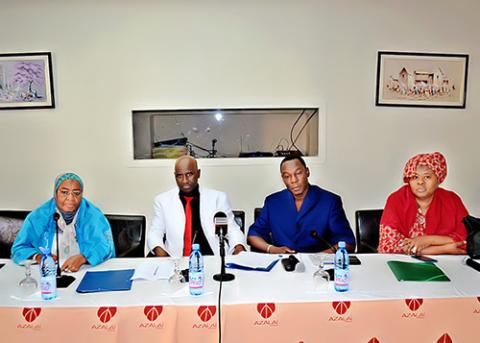
Date: 2017-08-09 19:53:28 ID: 1686
Bamako, 24 July 2017 – The West Africa Health Organisation (WAHO), within the framework of the post-forum follow-up on best health practices, started organising workshops to build capacity in Scaling Up (SCUP) best practices in health, for members of the national SCUP Committees. The event in Mali was organised on 24 July 2017 in the city of the three caimans, Bamako.
The general objective of the workshop was to build the capacity of members of the national SCUP Committee and the other national stakeholders involved in the replication or scaling up of priority best practices, based on country commitments and the alignment of technical and financial partners (TFP).
The Technical Adviser on Public Health Facilities, representing the Minister of Health and Public Hygiene (MSHP), presided over the opening ceremony. The Deputy National Director of Health, a representative of the TFPs, the Head of Maternal and Neonatal Health at WAHO, representing the Director General of WAHO, were with him.
In his opening speech the Technical Adviser expressed satisfaction for the organisation of the workshop and reiterated the commitment of the MSHP to support the process of scaling up best health practices in Mali.
Mali identified two best practices, which are the devolution of the implantation of Jadelle to the traditional birth attendants and mothers’ school: a tool for promoting antenatal consultation (ANC), assisted delivery and postnatal consultation (PNC).
These two practices informed the discussions. Thus, the contributions of the 29 participants from various backgrounds focused, among others, on the competence level of the traditional birth attendants, the side effects of Jadelle and the level of the women at the mothers’ school. There were also contributions on the duration of the study, the methodological procedure, post-training follow up on the traditional birth attendants and the abstracts of best practices.
The SCUP is defined as “deliberate efforts to sustainably strengthen the impact of successfully tested innovations for pilot projects, with a view to making the largest number of people benefit and to strengthening policies and programmes.”
It became clear that the consensus SCUP monitoring framework was a systematic reflection procedure. It comprised of a system made up of five independent elements, namely: innovation, user organisation, support team, general background and scaling up strategy within which the five areas of strategic choices (type of SCUP, dissemination and advocacy, organisational choices, costs and resource mobilisation, monitoring and evaluation) should be implemented. It defines the guiding principles (systemic approach, emphasis on sustainability, consolidation of the SCUP potential, and compliance with human rights, equity and gender equality) of the process.
It was also noted that the WHO/ExpandNet Guide on the design of pilot projects: “Keep the goal in mind right from the beginning” involved continuous reflection leading to the introduction of perspectives, which would lead to the requisite activities to facilitate future viable scaling up. It comprises 12 recommendations on knowing how to design pilot projects while keeping SCUP in mind. These 12 recommendations are taken into account when pilot projects are designed and during the implementation process.
The Director General of WAHO, Dr Xavier CRESPIN, later in the day thanked Mali for expressing the wish to be supported by WAHO for the scaling up her two (02) best practices selected. He ended his statement by congratulating Mali, which is one of only four out of the 15 ECOWAS countries to have established her SCUP Steering Committee.

